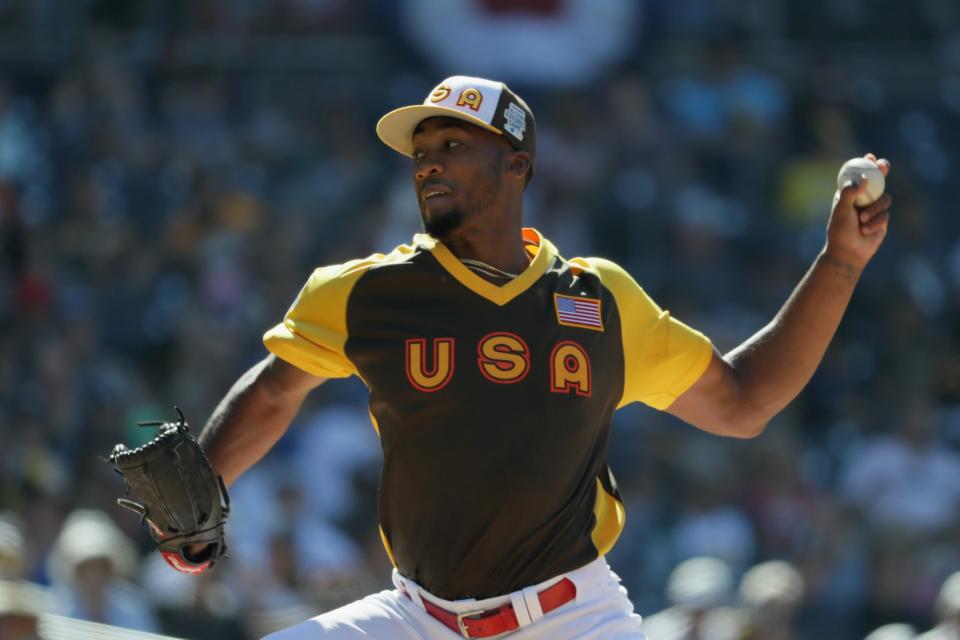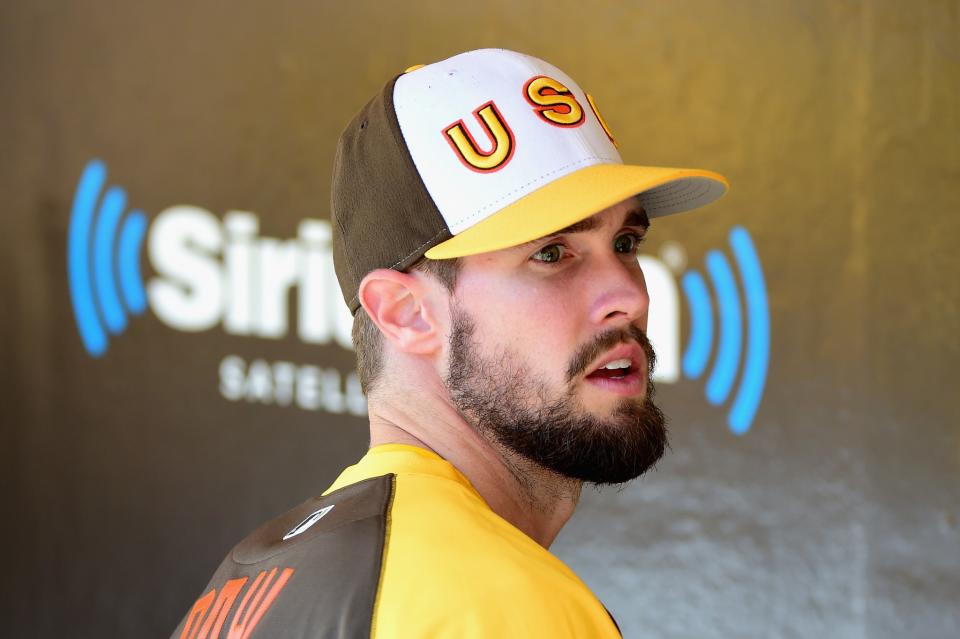MLB Futures game latest stop in journey of top prospects

SAN DIEGO – Dovydas Neverauskas’ uncle was a shoemaker in Lithuania and from spare leather made a baseball glove that he gave to his brother, and that is why Dovydas Neverauskas is here.
Amir Garrett’s grandfather, Papa, was paralyzed from the waist down, and would play catch with his grandson in the backyard of his house in Victorville, Calif., and feed baseballs onto a tee, and drop baseballs into a pitching machine, all from his wheelchair, and that is why Amir Garrett is here.
Eloy Jimenez’s father, Luis, was a basketball coach in Santo Domingo, Dominican Republic, who raised his oldest boy on the sport, then determined a broader athletic experience would do that boy some good – “You need to play other sports,” is what he said — and that is why Eloy Jimenez is here.
David Dahl was chasing a fly ball in New Britain, Conn., a little more than a year ago, crashed into a teammate, and then had to choose between losing the rest of his season or losing his spleen, and was on the operating table the next day, and that is why David Dahl is here.
They call it the MLB All-Star Futures Game, as though none of it counts until then, whenever then comes, assuming it does. But here they are, crowded into a couple big-league clubhouses two days before the main event, most barely out of their teens, some not yet out of them. They fill the lists of those who rank such things, and their names fill the air come the trade deadline, and then they show up at Petco Park on a sunny Sunday afternoon for three hours of being so close they can practically feel it on their shoulders.
For all of them, this is the journey, a tangle of paths and choices that stops over on the same day in the same town. For some, maybe, it is the best of that journey, and maybe they know it, feel it, in the way the game moves a little too fast and now they can feel themselves in the early, panicky throes of a stumble.
But they are here, in the god-awful yellow and brown and orange of past Padres, and what happens next is entirely theirs to decide, except of course for who they’ll play for and, for a long time, what they’ll be paid.
The 23-year-old from Vilnius, Lithuania, Neverauskas, is a right-handed pitcher with a 97-mph fastball and a father who for some reason adored baseball in a country that had hardly heard of the game. There were no baseball fields in his neighborhood beyond the ones they imagined in a backyard, and few parents would go along with their children playing a made-up sport with a rock-hard bat and a rock-hard ball on a rock-strewn field, and still the young man they call “Never” kept showing up, kept practicing, kept playing. Eighty years ago a man born in Lithuania had a few at-bats in the big leagues. That’s the list so far. The Pittsburgh Pirates signed Neverauskas out of a tryout for $60,000.
“I thought everything was going to be easy,” he said. “It wasn’t.”
He was 4,500 miles from home, playing an unusual sport in towns nobody knew of, and when he returned, well, very few even asked where he’d been.
“They don’t know me there,” he said with a smile. “I’m Mr. Nobody at home.”
That’s OK with “Never.”
“It’s my job,” he said. “It’s my dream.”

Amir Garrett was a basketball player good enough to play two years at St. John’s University, and conflicted enough about that to become a pitcher full-time not long after the Cincinnati Reds chose him with the 685th overall pick in the 2011 draft. He is, today, their top prospect, a lefty with a fastball of 96 mph and a vertical leap of 37 ½ inches.
He is 24 years old, on a journey that took him to three high schools and two colleges and a couple sports, and on an afternoon in which he inched a day closer to the big leagues, he said his grandfather would be proudest. Papa served in the military and then, Amir couldn’t exactly remember, thought a car accident put him in that wheelchair. He died when Amir was in eighth grade.
“He’s the one who taught me baseball,” he said. “And I know he’s up there smiling ear to ear.”
Eloy Jimenez is 19. He is an outfielder for the Chicago Cubs, who three years ago signed him for $2.8 million, an investment worthy of 2013’s top international prospect. He is 6-foot-4 and 210 pounds, three years after being a couple inches shorter and 35 pounds lighter. He is a .332 hitter with 10 home runs for South Bend in the Midwest League, where he’s playing two or three years over his head.
His father came here to watch his boy, who seven years ago was following him to basketball practice and dribbling basketballs in the driveway while the other boys were molding baseballs out of duct tape. A little encouragement sent Eloy out into the neighborhood with them, and he came back a few years later a ballplayer.
“Baseball,” he said, “became my passion.”
Eloy smiled broadly.
“This,” he said, “is an honor for me, being so young, playing with these guys, representing my country and my team.”

Thirteen months ago, David Dahl was in a hospital bed. They’d removed his spleen, as he’d asked. His options were to allow the spleen – lacerated in a collision with his second baseman – to heal, which would cost him the remainder of the season, or … not.
“You realize how much you love the game, how much you love playing,” he said. “There was some question if I could play again. It’s eye-opening.”
So he minds his flu shots and vaccines. He tries to eat, as he lost 15 pounds in that hospital bed and never really got them back. And he gains on a job in the outfield for the Colorado Rockies. And every once in a while he allows his thoughts to drift back over the past 13 months, 13 months he didn’t see coming.
“Just the hard work I put in to overcome that crazy injury,” he said. “It’s very humbling, for sure.”
They’re predicting the future here, because that’s what baseball can be. There are millions of dollars out there, the career stability of hundreds of adults is out there, the moment when a game becomes something else – a grind, a passion, an anxiety attack, the future – is out there. They’ve already stacked up enough todays to begin trading on tomorrow.
The world is a better place with baseball in it. That we know. It’s more fun and it’s friendlier. It’s more colorful. It speaks in a dozen tongues, and even the English can come streaked by the streets of Santo Domingo, of Nagoya, of Vilnius, of Willemstad, of Maracay, of Busan, of Victoria, of San Juan, of Havana, of Elizabeth, of Bumtown.
Maybe the future can wait, because today is pretty good too. After all, it’s why they’re here.

